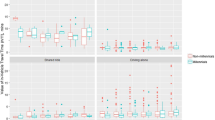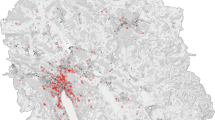Abstract
Waiting, whether for services, for someone, or for something, is an inescapable part of life. This paper addresses a gap in the waiting time literature by examining previously sparsely studied relationships between individual- and travel-related characteristics and attitudes toward waiting using a revealed preference dataset of Northern California commuters (N = 2617). Correlational analyses, followed by a trivariate seemingly unrelated regression equations model, are developed for three waiting attitudinal constructs: general tolerance toward waiting, and attitudes toward equipped and expected waiting. Socioeconomic and demographic characteristics, time use perceptions and preferences, personality traits, multitasking attitudes (polychronicity), commute preferences and expectations, and general attitudes (e.g. pro-technology) are all seen to have significant effects on waiting attitudes. As this survey was executed on commuters, it also facilitates a unique simultaneous exploration of travel and wait time attributes, time uses that are often similarly viewed in day-to-day life. From this perspective, we see that longer commute times and distances are correlated with negative attitudes toward waiting, while commuters with pro-transit, pro-density, and pro-active transportation attitudes tend to have positive attitudes toward waiting. Additionally, we see that those with preferences for multitasking in general or at their jobs can tolerate waiting better. Overall, this study constitutes a distinctive contribution to the waiting time literature, capitalizing on a rich dataset to make important connections between related time uses and a multitude of other variables—key among them polychronicity, with its potential ability to reduce the negative perception and experience of waiting. Findings from this study may also benefit transportation and other service providers by facilitating an understanding of how various consumer groups/demographics view waiting, thus enabling providers to better cater to diverse needs/populations.

Source: Modified from Mishra et al. (2015)
Similar content being viewed by others
Notes
Of course, not everyone will have read or internalized the preface equally thoroughly, so some respondents may have had a different context in mind when reporting their attitudes.
As Watts and Urry (2008, p. 870) aptly put it, “Unpacking takes time and space; therefore a journey where there is not enough time or space to unpack creates a sense of being squashed, even if the person has a seat and the vehicle is clean and punctual. Passengers are forced either to remain packed whilst travelling and consequently can make little use of their time. Or, … passengers adapt to cramped and short journeys by only partially unpacking with music players, mobile phones, and novels ready-to-hand…”.
References
Alemi, F., Circella, G., Mokhtarian, P., Handy, S.: What drives the use of ridehailing in California? Ordered probit models of the usage frequency of Uber and Lyft. Transp. Res. Part C Emerg. Technol. 102, 233–248 (2019). https://doi.org/10.1016/j.trc.2018.12.016
Allen, J., Eboli, L., Mazzulla, G., Ortúzar, J.D.: Effect of critical incidents on public transport satisfaction and loyalty: an ordinal probit SEM-MIMIC approach. Transportation (2018). https://doi.org/10.1007/s11116-018-9921-4
Allen, J., Muñoz, J.C., Ortúzar, J.de D.: On the effect of operational service attributes on transit satisfaction. Transportation (2019). https://doi.org/10.1007/s11116-019-10016-8
Antonides, G., Verhoef, P.C., Van Aalst, M.: Consumer perception and evaluation of waiting time: a field experiment. J. Consum. Psychol. 12(3), 193–202 (2002). https://doi.org/10.1207/S15327663JCP1203_02
Baker, J., Cameron, M.: The effects of the service environment on affect and consumer perception of waiting time: an integrative review and research propositions. J. Acad. Mark. Sci. 24(4), 338–349 (1996). https://doi.org/10.1177/0092070396244005
Banerjee, I., Kanafani, A.: The value of wireless internet connection on trains: Implications for mode-choice models. IDEAS Working Paper Series from RePEc (2008). https://escholarship.org/uc/item/8kf2t753. Accessed June 2018
Bielen, F., Demoulin, N.: Waiting time influence on the satisfaction-loyalty relationship in services. Manag. Serv. Qual. Int. J. 17(2), 174–193 (2007). https://doi.org/10.1108/09604520710735182
Chatterjee, K., Clark, B., Martin, A., Davis, A.: The commuting and wellbeing study: understanding the impact of commuting on people’s lives. (2017). Retrieved from https://travelbehaviour.files.wordpress.com/2017/10/caw-summaryreport-onlineedition.pdf. Accessed June 2018
Chen, X., Zheng, H., Wang, Z., Chen, X.: Exploring impacts of on-demand ridesplitting on mobility via real-world ridesourcing data and questionnaires. Transportation (2018). https://doi.org/10.1007/s11116-018-9916-1
Circella, G., Mokhtarian, P., Poff, L.K.: A conceptual typology of multitasking behavior and polychronicity preferences. Electr. Int. J. Time Use Res. 9(1), 59–107 (2012). https://jtur.iatur.org/home/article/76fb57e3-84b8-43c1-966a-67d281b37e59. Accessed 10 Oct 2019
Csiszár, C., Zarkeshev, A.: Demand-capacity coordination method in autonomous public transportation. Transp. Res. Proc. 27, 784–790 (2017). https://doi.org/10.1016/j.trpro.2017.12.109
Durrande-Moreau, A.: Waiting for service: ten years of empirical research. Int. J. Serv. Ind. Manag. 10(2), 171–194 (1999). https://doi.org/10.1108/09564239910264334
Durrande-Moreau, A., Usunier, J.-C.: Time styles and the waiting experience. J. Serv. Res. 2(2), 173–186 (1999). https://doi.org/10.1177/109467059922005
Echaniz, E., Ho, C., Rodriguez, A., dell’Olio, L.: Modelling user satisfaction in public transport systems considering missing information. Transportation (2019). https://doi.org/10.1007/s11116-019-09996-4
Ettema, D., Friman, M., Gärling, T., Olsson, L.E., Fujii, S.: How in-vehicle activities affect work commuters’ satisfaction with public transport. J. Transp. Geogr. 24, 215–222 (2012). https://doi.org/10.1016/j.jtrangeo.2012.02.007
Fan, Y., Guthrie, A., Levinson, D.: Waiting time perceptions at transit stops and stations: effects of basic amenities, gender, and security. Transp. Res. Part A Policy Pract. 88, 251–264 (2016). https://doi.org/10.1016/j.tra.2016.04.012
Friman, M.: Affective dimensions of the waiting experience. Transp. Res. Part F Psychol. Behav. 13(3), 197–205 (2010). https://doi.org/10.1016/j.trf.2010.04.006
Gasparini, G.: On waiting. Time Soc. 4(1), 29–45 (1995). https://doi.org/10.1177/0961463X95004001002
Hadiuzzaman, M., Farazi, N.P., Hossain, S., Malik, D.M.G.: An exploratory analysis of observed and latent variables affecting intercity train service quality in developing countries. Transportation 46(4), 1447–1466 (2019). https://doi.org/10.1007/s11116-017-9843-6
Heijmans, R., Neudecker, H.: Estimation of the SURE model. Stat. Pap. 39(4), 423–430 (1998). https://doi.org/10.1007/BF02927105
Hughes, R., MacKenzie, D.: Transportation network company wait times in greater seattle, and relationship to socioeconomic indicators. J. Transp. Geogr. 56, 36–44 (2016). https://doi.org/10.1016/j.jtrangeo.2016.08.014
Ji, Y., Gao, L., Fan, Y., Zhang, C., Zhang, R.: Waiting time perceptions at bus and metro stations in Nanjing, China: the importance of station amenities, trip contexts, and passenger characteristics. Transp. Lett. (2017a). https://doi.org/10.1080/19427867.2017.1398854
Ji, Y., Zhang, R., Gao, L., Fan, Y.: Perception of transfer waiting time at stops and stations in Nanjing, China. Paper presented at the 96th Annual Meeting of the Transportation Research Board, Washington D.C. (2017b)
Kahneman, D., Krueger, A.B.: Developments in the measurement of subjective well-being. J. Econ. Perspect. 20(1), 3–24 (2006). https://doi.org/10.1257/089533006776526030
Kaparias, I., Rossetti, C.L., Holloway, C.: Investigating the value of waiting time at bus stops. Paper presented at the 96th Annual Meeting of the Transportation Research Board, Washington D.C. (2017)
Lyons, G., Jain, J., Holley, D.: The use of travel time by rail passengers in Great Britain. Transp. Res. Part A Policy Pract. 41(1), 107–120 (2007). https://doi.org/10.1016/j.tra.2006.05.012
Lyons, G., Urry, J.: Travel time use in the information age. Transp. Res. Part A Policy Pract. 39(2–3), 257–276 (2005). https://doi.org/10.1016/j.tra.2004.09.004
Maister, D.: The psychology of waiting lines. In: Czepiel, J.A., Solomon, M.R., Suprenant, C.F. (eds.) The Service Encounter, pp. 113–124. D.C. Heath and Company, Lexington Books, Lexington (1985)
Malokin, A., Circella, G., Mokhtarian, P.L.: How do activities conducted while commuting influence mode choice? Using revealed preference models to inform public transportation advantage and autonomous vehicle scenarios. Transp. Res. Part A Policy Pract. 124, 82–114 (2019). https://doi.org/10.1016/j.tra.2018.12.015
Mishra, G.S., Mokhtarian, P.L., Widaman, K.F.: An empirical investigation of attitudes toward waiting on the part of Northern California commuters. Travel Behav. Soc. 2(2), 78–87 (2015). https://doi.org/10.1016/j.tbs.2014.09.002
Mokhtarian, P.L., Papon, F., Goulard, M., Diana, M.: What makes travel pleasant and/or tiring? An investigation based on the French National Travel Survey. Transportation 42(6), 1103–1128 (2015). https://doi.org/10.1007/s11116-014-9557-y
Neufeld, A.J., Mokhtarian, P.L.: A survey of multitasking by Northern California commuters: description of the data collection process. University of California Davis. Davis (2012). http://www.its.ucdavis.edu/research/publications/publication-detail/?pub_id=1802. Accessed June 2018
Nie, W.: Waiting: integrating social and psychological perspectives in operations management. Omega 28(6), 611–629 (2000). https://doi.org/10.1016/S0305-0483(00)00019-0
Office for National Statistics: Commuting and personal well-being. Newport, United Kingdom (2014). http://www.ons.gov.uk/ons/dcp171766_351954.pdf. Accessed June 2018
Pruyn, A., Smidts, A.: Effects of waiting on the satisfaction with the service: beyond objective time measures. Int. J. Res. Mark. 15(4), 321–334 (1998). https://doi.org/10.1016/S0167-8116(98)00008-1
Rasouli, S., Timmermans, H.: Judgments of travel experiences, activity envelopes, trip features and multi-tasking: a panel effects regression model specification. Transp. Res. Part A Policy Pract. 63, 67–75 (2014). https://doi.org/10.1016/j.tra.2014.02.012
Rhee, K.-A., Kim, J.-K., Lee, B.-J., Kim, S., Lee, Y.-I.: Analysis of effects of activities while traveling on travelers’ sentiment. Transp. Res. Rec. J. Transp. Res. Board 2383, 27–34 (2013). https://doi.org/10.3141/2383-04
Russell, M.L.: Travel time use on public transport: what passengers do and how it affects their wellbeing (Doctor of Philosophy), University of Otago, Dunedin (2012)
Shaw, F.A., Malokin, A., Mokhtarian, P.L., Circella, G.: It’s not all fun and games: an investigation of the reported benefits and disadvantages of conducting activities while commuting. Travel Behav. Soc. 17, 8–25 (2019). https://doi.org/10.1016/j.tbs.2019.05.008
Susilo, Y., Lyons, G., Jain, J., Atkins, S.: Rail passengers’ time use and utility assessment. Transp. Res. Rec. J. Transp. Res. Board 2323, 99–109 (2012). https://doi.org/10.3141/2323-12
Taylor, S.: Waiting for service: the relationship between delays and evaluations of service. J. Mark. 58(2), 56 (1994)
van Hagen, M.: Waiting Experience at Train Stations. University of Twente, Enschede (2011)
Wang, P.-C., Hsu, Y.-T.: Analysis of waiting time perception of bus passengers provided with mobile service. Paper presented at the 97th Annual Meeting of the Transportation Research Board, Washington D.C. (2018)
Wardman, M.: Public transport values of time. Transp. Policy 11(4), 363–377 (2004). https://doi.org/10.1016/j.tranpol.2004.05.001
Watkins, K.E., Ferris, B., Borning, A., Rutherford, G.S., Layton, D.: Where is my bus? Impact of mobile real-time information on the perceived and actual wait time of transit riders. Transp. Res. Part A 45(8), 839–848 (2011). https://doi.org/10.1016/j.tra.2011.06.010
Watts, L., Urry, J.: Moving methods, travelling times. Environ. Plan. D Soc. Space 26(5), 860–874 (2008). https://doi.org/10.1068/d6707
Zellner, A.: An efficient method of estimating seemingly unrelated regressions and tests for aggregation bias. J. Am. Stat. Assoc. 57(298), 348–368 (1962). https://doi.org/10.2307/2281644
Acknowledgements
Survey design, implementation, and previous analyses for this project were funded by a succession of University of California, Davis University Transportation Centers, a faculty grant from the Georgia Institute of Technology, and the Capitol Corridor Joint Powers Authority (CCJPA). Atiyya Shaw was funded under a National Science Foundation (NSF) Graduate Research Fellowship (GRF), Grant DGE 1650044. The authors are grateful to those who were involved in survey design, data collection, and data entry/cleaning, especially Amanda Neufeld and Zhi Dong. Any opinions, findings, and conclusions or recommendations expressed in this paper are those of the authors and do not necessarily reflect the views of the funding agencies. The authors are grateful for the constructive comments and suggestions of the anonymous reviewers. On behalf of all authors, the corresponding author states that there is no conflict of interest.
Author information
Authors and Affiliations
Contributions
FAS: literature review, analysis and interpretation of results, manuscript preparation; AM: data collection and cleaning, manuscript review; PLM: survey instrument design, data collection, feedback on analysis, manuscript review; GC: survey instrument design, data collection, manuscript review.
Corresponding author
Additional information
Publisher's Note
Springer Nature remains neutral with regard to jurisdictional claims in published maps and institutional affiliations.
Appendix
Appendix
Rights and permissions
About this article
Cite this article
Shaw, F.A., Malokin, A., Mokhtarian, P.L. et al. Who doesn’t mind waiting? Examining the relationships between waiting attitudes and person- and travel-related attributes. Transportation 48, 395–429 (2021). https://doi.org/10.1007/s11116-019-10054-2
Published:
Issue Date:
DOI: https://doi.org/10.1007/s11116-019-10054-2




